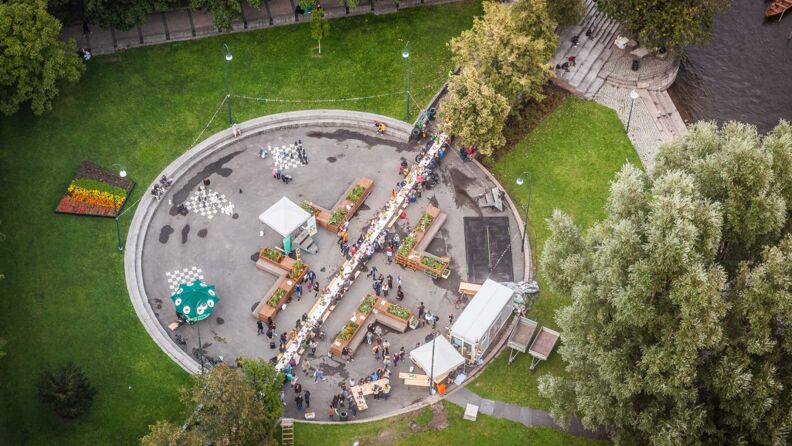Oslo European Green Capital 2019
The European Commission awarded Oslo the prestigious European Green Capital title for 2019. This page contains information on why Oslo won, and what happened in 2019.
What happened in 2019?
In 2019 Oslo was European Green Capital. Receiving the title recognizes that Oslo, for decades, has delivered on ambitious climate and environment goals. But the title also comes with an obligation to develop further so that we can reach the goals we have set for 2030.
The content of the Green Capital Year was wide-ranging, and early in 2020 a comprehensive report was written that sums up the different projects and activities that were carried out.
Read the report in screen version (PDF 4MB)
Read the report in print version (PDF 4,1MB)
On this page you may read excerpts from the report, and you will find appendixes towards the end of the page.
Why did Oslo win?
Every year since 2010, the European Commission has awarded one city the European Green Capital title. The winner is chosen through an open competition where applicant cities document their progress during the last five to ten years, their current status, and their future plans.
The applicant cities are measured on 12 indicators including efforts to reduce greenhouse gas emissions, improve quality of air and water, environmental innovation, access to green areas, biodiversity, and green mobility. Oslo competed with 13 other cities when the application was assessed in 2017.
Oslo achieved the highest possible rank in 8 out of 12 indicators. The jury especially noted Oslo’s holistic approach covering a broad range of topics such as biodiversity, public transport, social integration, and citizen health gathered under the overarching theme ‘City for everyone, putting people first’. Although Oslo’s work is not complete, its measures in many fields can inspire other cities.
Oslo’s ranking among the applicant cities
(1 is the best, 14 is the poorest):
- Climate change: mitigation and adaption 1
- Local transport 1
- Green urban areas and sustainable land use 2
- Nature and biodiversity 1
- Ambient air quality 1
- Quality of the acoustic environment 1
- Waste production and management 1
- Water management 6
- Wastewater treatment 7
- Eco innovation and sustainable employment
- Energy performance 1
- Integrated environmental management 2
What makes Oslo a Green Capital?
- One of the world’s most ambitious climate strategies - in line with the Paris agreement.
- The first city in the world with its own Climate Budget.
- A world leader on electric mobility.
- The first city to test Carbon Capture and Storage (CCS) from waste incineration.
- A pioneer in circular waste management, making sure waste becomes new resources.
- Using our purchasing power to accelerate the green transition, for example by creating a market for zero-emission construction machinery.
- Large investments in public transportation and bicycle infrastructure.
- Preserved our nature and biodiversity through decades of massive urban development.
- Reopened waterways that were covered and piped as the city grew.
Goals for the European Green Capital Year
Great ambitions and high expectations formed the basis of Oslo’s European Green Capital Year.
When Oslo won the European Green Capital title in June 2017, it was a key goal to involve the entire Oslo community. From that moment, Oslo had one and a half years to dedicate to planning before the year began.
City Government Decision 1022/18 - Strategy for Oslo European Green Capital 2019 sets out the principles and priorities for the planning and running of the year. The strategy designated involvement, joint contributions, and long-term value as guiding principles.
Main goals
- Promote the citizens’ green transition
Activate citizens’ continued efforts in the green transition and engage the entire population. - Strengthen the green economy
Take advantage of the spotlight to promote innovative, green companies and stimulate further development of the green economy. - Be a role model for other cities
Facilitate knowledge sharing; exchange of best practice; and experience, debate, and dialogue to disseminate solutions that promote sustainable urban development. This is to be done in cooperation with Norwegian cities, the Oslo region, and in cooperation with the national government and international cities and networks. - Strengthen Oslo’s international profile as a green city
Communicate the full story of Oslo’s green urban city life internationally with the aim to attract the best talents, investments, companies ,startups, visitors, and tourists. - Increase support for continued ambitious environmental and climate goals
Spread knowledge and engage the citizens, organizations, academia, and the business community to reach the target of becoming a zero-emission city in 2030.
Results
- We have mobilized a population that is evermore engaged and environmentally concerned.
- We have supported neighbourhoods, organisations, and associations that are building a greener city from the ground up.
- We have strengthened the municipality’s work on climate and environment, from kindergartens to cemeteries.
- The city’s business community has stepped up to the challenge, contributing with green solutions for the future. They have challenged us, but we have also challenged them!
- We have facilitated new alliances and enabled cooperation across sectors. Throughout 2019, Oslo’s innovative climate solutions have reached a worldwide audience, leading to change far outside the city limits.
A more comprehensive description of the results is to be found in the report, which you can find at the top of this page.
New commitments
The Green Capital Year was used to initiate a range of new commitments from the City of Oslo.
Strengthened climate education in schools, dedicated programmes for the city districts and a Business Programme were only three of them.
Appendix
List of international press coverage (PDF 0,1MB)



